INTERVIEW: Sudan expert warns of return to war over Abyei
‘- Abyei will be the nexus of a conflict that could torpedo the CPA and trigger war if not resloved
– Darfur rebels could be looking for a strategic depth, and south Sudan is in the agendas
– Darfur rebel groups negotiating in Doha are not the real military powers on the ground
-Sudan has options to extricate itself from the ICC bind
– New Darfur strategy is a good idea, but it has some serious flaws
– Security arrangements will be a moot point after referendum
– The CPA turned out to be a six-year ceasefire, and failed to achieve its objectives
By Muhammad Osman
December 1, 2010 (NAIROBI) – Sudan Special Adviser at the global think-tank International Crisis Group (ICG) and the African Union (AU), Fouad Hikmat, has warned that the perpetuation of the current stalemate between north and south Sudan over the future of the oil-producing area of Abyei could reignite war if not resolved.
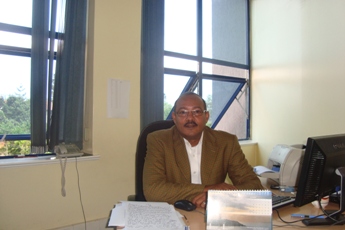
Hikmat has also called for the establishment of what he termed “institutions for political interaction” between north and south Sudan to serve as channels for continuing dialogue and negotiations on post-referendum issues after secession.
The ICG’s prominent expert has spoken at length about the government’s new strategy in Darfur, saying that its weakness lies in contradictions between theory and practice.
The latest round of civil war between north and south Sudan started in 1983 and lasted over two decades, until the signing of the 2005 Comprehensive Peace Agreement (CPA) between the governing National Congress Party (NCP) in north Sudan and the former southern rebels Sudan People’s Liberation Movement (SPLM).
Under the CPA, south Sudan was given greater autonomy and promised a chance to gain full independence from the north in a referendum vote set to take place around January 2011.
Another plebiscite is stipulated to take place at the same time in the central contested area of Abyei to determine whether it should remain in the north or join the south.
Just as the drums of peace began to be beaten in south Sudan, drums of war began to be heard in Sudan’s western region of Darfur. Rebels belonging mostly to African ethnicities rose up against the government in 2003, accusing it of depriving the region of development.
The rebellion prompted the government to unleash a counterinsurgency that resulted in a human catastrophe of 300,000 people killed and more than 2 million displaced, according to UN figures. The government says the figures have been exaggerated and that the real total is around 10,000.
Dangers of military provocations – Message of Darfur rebels in the south
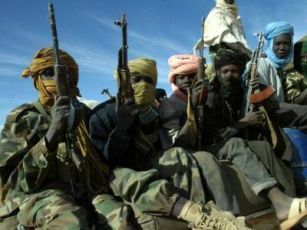 Relations between the SPLM and the NCP have recently reached a tense point over the north’s accusation that the SPLM is harboring Darfur armed groups in the south.
Relations between the SPLM and the NCP have recently reached a tense point over the north’s accusation that the SPLM is harboring Darfur armed groups in the south.
North Sudan’s army carried out an air strike on November 23 on an army base at Kiir Adem, an area located 45 miles away from Aweil North County, Northern Bahr el Ghazal state of Southern Sudan. South Sudan’s army said four of its soldiers were critically injured in the attack.
A similar incident occurred earlier on November 13 when warplanes belonging to north Sudan’s army dropped a bomb in the state of Northern Bahr el Ghazal.
The two attacks are believed to be in attempts to flush out Darfur rebels from the south.
Commenting on these recent developments, Hikmat cautioned that military provocations are “more dangerous” than political provocations. He suggested that the SPLM had opted out of response to these provocations because it did not want to disturb the run-up to the referendum, which is the SPLM’s primary objective, he added.
Hikmat said that the fact that the NCP is accusing the SPLM of harboring or allowing Darfur armed groups to carry out political and military work from within its territories was “considered a breach of the hostility-cessation agreement between north and south Sudan, and therefore a violation of the CPA.”
However, Hikmat added that the SPLM could argue that Darfur rebels are Sudanese citizens who have problems with the central government and came to the south which is still a part of Sudan, as long as they are not using south Sudan’s territories to launch military operations.
“There are messages being sent” said Hikmat. He explained that by being in the south, Darfur rebels are sending a message saying that they don’t accept the Doha peace talks and they intend to continue their armed struggle against the government.
“Darfur rebels could be looking for a strategic depth, and south Sudan is in the agendas,” he suggested.
The Sudanese government is currently engaged in floundering negotiations in the Qatari capital of Doha with one of the many Darfur rebel factions: the Liberation and Justice Movement (LJM).
The Justice and Equality Movement (JEM) walked out of the talks earlier this year citing breaches by Khartoum to a ceasfire agreement. The faction of the Sudan Liberation Movement (SLM) led by the France-based rebel leader Abdel-Wahid Mohamed Nur has refused to take part.
For Hikmat, the government is also sending a message saying that it could and has the right to strike Darfur rebels wherever they hide. However, Hikmat said that the government in the north is also conscious of the fact that it should not go too far in provoking the SPLA as this could also be considered as violation of the cease-fire agreement.
Hikmat faulted the NCP for rejecting previous attempts by the SPLM to mediate between the government and Darfur rebels, saying it was a “very big mistake.”
Darfur strategy – contradictions between theory and practice
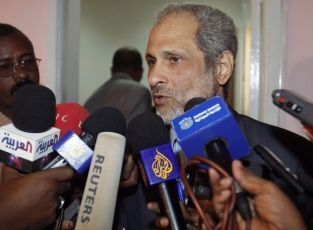
The strategy also purports to be focused on creating conditions conducive for the return of refugees to their home villages and on reducing the amount of aid assistance in the camps in order to encourage them to return.
Hikmat believes that the strategy is “a good attempt on the government part, because for the first time there at least is a strategy, regardless of its weaknesses or strength.”
“But it has some serious flaws,” he added, saying that the strategy is suffering from “contradictions between theory and practice.”
The first shortcoming of the new strategy is the fact that the rebel groups negotiating in Doha do not represent all rebel groups and are also not “the real military power on the ground.”
Hikmat further said that the second objective of Darfur strategy, which aims to involve members of the legislative councils in Darfur on consultation over a peace agreement, is tarnished by the fact that those representatives are in reality NCP affiliates who were brought to power through April’s rigged elections.
“Therefore, it is a strategy put forward by the government, which itself was part of the conflict, and presented to its own affiliates and representatives to discuss,” he remarked.
“The elections that brought those representatives to power were not really elections” Hikmat added, referring to the widely disputed results of last April’s general elections in Sudan.
According to Hikmat, the third objective of the strategy, which is return of IDPs and reconstruction, is being undermined by the government’s attempts to disband refugee camps.
“The viable conditions for the return of the IDPs are not established, so the international community will be left with no choice but to continue providing aid in camps” he said.
Mitigating the shortcomings of the strategy requires a genuine political will on the part of the NCP, said Fouad, adding that such political will could be materialized in the form of political decisions without negotiations to open roads for resolving Darfur crisis.”
Justice in Darfur – way out of ICC bind
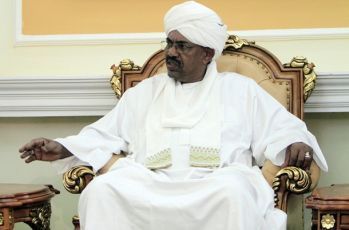
The court has so far indicted three Sudanese individuals, including President Omer Hassan Al-Bashir for whom the court issued an arrest warrant in March 2008 on charges of masterminding war crimes and crimes against humanity in the region.
Later in February 2011, the court issued a second warrant of arrest for Bashir on the charge of genocide. For its part, the Sudanese government refused to cooperate with the court and denigrated the charges as part of a Western ploy to overthrow the government.
Hikmat underlined the importance of serving justice in Darfur, saying it is “an integral part of a genuine reconciliation process.”
According to Hikmat, the issue of justice in Darfur was best diagnosed in the final recommendations of the AU High Level Implementation Panel on Sudan (AUHIP) led by former South African President Thabo Mbeki, which concluded that the “Darfur problem is the problem of Sudan in Darfur.”
Hikmat said this means that the fundamental cause for impunity and lack of judicial accountability is that the top leadership is acting with impunity and that the judiciary is not independent.
“In order to resolve the issue of justice in Darfur, the justice system in Sudan must be reviewed wholly and fundamentally,” Hikmat said. However, he later added that such reforms are not possible under the current circumstances.
Hikmat said that the government must reverse the system of crime in Darfur, put an end to impunity, establish credible judicial accountability and gather arms from all unofficial militias.
“The government has a responsibility to serve Justice in Darfur”, he said, but added that “we must not forget that the government was not a neutral side in Darfur conflict, it was rather a side in the conflict.”
“If there is independent judiciary, the government could be held accountable,” he said.
Hikmat sees the real problem in the association between the state and the NCP.
“There is real confusion because the state has become the NCP and the NCP has become the state. So NCP officials decided as a state not to cooperate with the ICC,” Hikmat elaborated.
“But this will not make ICC decisions go away,” said Hikmat.
In Hikmat’s opinion, the only way out of the ICC situation, other than a deferral by the UN Security Council or extraditing the individuals wanted, is for the Sudanese state to instigate legal proceedings against individuals suspected of being involved in Darfur atrocities.
“The government must do so at a level acceptable by international community and at the same time to bring about a final and lasting solution to Darfur,” he added.
Solving the problem of justice “depends on the political will of the government” he said, adding that the Darfur problem can be solved through “a political decision from the center.”
Post-referendum – security arrangements to remain a “moot point”
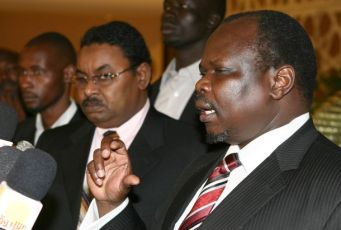
For Hikmat, “It is hard to imagine that there would be a total disengagement between north and south Sudan, because there are social and economic situations connecting the two sides.”
Hikmat said that the NCP will bear a bitter responsibility for south Sudan’s secession because the party would go down in history as the party that “rejected multiparty systems and democracy and instead aimed at forcing an Arab and Islamic identity that disregards diversity and views others as minority groups to be accommodated, not as people with full citizenship rights.”
“Such unity is not attractive to many regions; and south of Sudan might not be the last to demand self-determination under such a system” he added.
Hikmat said that among other post-referendum issues, security arrangement would be a moot point between north and south Sudan after the referendum, mainly because the SPLM would not be able to limit its ties with the Nuba Mountains and the Blue Nile, which lie north of the border but are home to communities that fought with the south in the civil war.
On the issue of citizenship, Hikmat called for establishing social peace between local communities in border areas. He pointed out that the immediate interest of the tribes living to the north of the 1956’s border strip lies, in both the long and short term, with south Sudan.
“Until the style of livelihoods of these nomadic tribes is modified or changed,” the only solution is social peace, because those tribes are interlinked.
He also argued that the government in the north will face legal and political constraints if it attempted to expel southerners or deprive them of citizenship.
“There are nearly 2 million southerners in the north, most of them will not register to vote, and many have already returned to the south. So from a legal and political viewpoint those southerners could claim that they were in favor of unity and ask the government: Why are you denying us citizenship?
Calls for establishing institutions for political interaction after secession
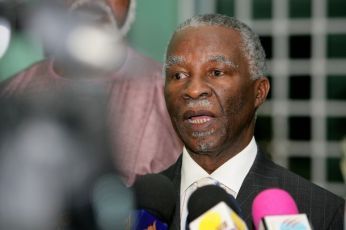
The purpose of the proposed institutions, according to Hikmat, is to allow continued dialogue and resolution of pending issues between north and south Sudan at the political and legislative levels to finalize an agreement on post-referendum issues.
Abyei – warnings of return to war
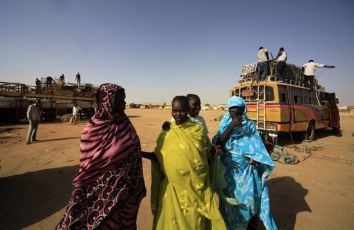
The court ruled to redraw the boundaries of Abyei, ceding key oilfields to north Sudan but giving the South most of the land including Abyei town which has huge areas of fertile land and one significant oilfield.
Abyei’s referendum is unlikely to take place as scheduled in January 2011, thanks to a deadlock between north and south Sudan over who can vote in the plebiscite.
North Sudan wants the cattle-herding Arab tribe of Al-Missiryah, whose members cross intio Abyei a few months a year to graze their cattle, to vote in the referendum. South Sudan on the other hand insists that the only people eligible to vote are Abyei’s indigenous inhabitants: the Dinka Ngok ethnic groups.
Hikmat fears that “in the absence of an agreement on boundaries and movement across borders, it is very difficult to solve the problem.”
He says the NCP is making the situation difficult to resolve because the party feels that south Sudan is going to secede at a low cost and wants to gain as much as it possibly can by using Abyei as “a bargaining chip.”
“If Abyei problem is not solved,” he warned “and no political agreement is communicated to the tribes on the ground, Abyei will be the nexus of a conflict that could very well torpedo the CPA and trigger war.”
Hikmat regretted that the CPA turned out to be “a cease-fire agreement” and failed to achieve its key principles of remedying the long-standing political and social problems in Sudan.
“What is urgently required now is to sustain that ceasefire and not to obstruct the referendum” he concluded.
(ST)

Thongjang Thongjang
INTERVIEW: Sudan expert warns of return to war over Abyei
NIF must get ready for three fronts? SPLM/A/Dufurs rebels/eastern fronts as well as Nuba mountain/blue Nile forces! Forgotten about getting oil deal in Abyei Dinka land of Kush! Genocide is coming Khartoum soon dogg!!!!!!!!!!!!!!. Rabbi Thongjang Thongjang.
Aleu
INTERVIEW: Sudan expert warns of return to war over Abyei
The NCP and even president himself knows that, they have made a seriously violation of peace agreement when they attacked the SPLA’s position in Renk killing 9 years Old girl and wounded many others and that attacked was not because of what the term it as the SAF were drunk that is not the answer, but they done it by intentional purpose as they are still putting their militia to make ambushed to the SPLA this is the clear sign the NCP and SAF have a plan.
The twices of the air bomb shell in Northern Bahr el Ghazal State were clearly not only a violation of the CPA implementation rules, but it was absolutely officially a declaring of war on the Southern Sudan and it is undeniable by the Khartoum government and the rest of NCP are even shocking, because of too many crimes still added by their government and those Idiocy people who desperately for leadership are pushing Omar al Bashir to the real fire. They don’t think the war would have been won two decades ago if they thinks it was easy to defeated the powerful Military wing of the SPLA. These Ideas of people that, are out of touch and seemingly that, they are losing their minds and everythings in Sudan.
Boldit
INTERVIEW: Sudan expert warns of return to war over Abyei
South Sudanese aren’t fearing war aganist North but we’re followeed the comprehensive peace and agreement which gives us a right of Self determination. Our standard arrangement of Referendum is on the way, so there is no need of fighting before we comfirm South Sudan as a indenpendent Country. If we understand a new Nation than we can fight Arabs until Suadi Arabia. North Sudan with their pressmiistic will be in hard place this days, we don’t care matter what they said.
Udukcana.J
INTERVIEW: Sudan expert warns of return to war over Abyei
uh, war and warning are normal things the Khartoum uses for political gain.who Don’t know how to warn or go to war.Conflicts is sudan’s most recorded event in the history of the country, but there is something to try this time before going to war.ballot box for seperation.
Kolnyang youth
INTERVIEW: Sudan expert warns of return to war over Abyei
I think war will be the next solution to Abyei problem to let you aware that ,you arabs agreed everything want you are defeated so South -north war will begin soon .
make sure what come around goes around ? this time arabs are going have every big problem because southerners will fight arab and dafurians will do so and let see whether bashir will remained as a president of Sudan not forgetting eastern Sudan rebel will also fight against the Government of Sudan
thank you a lot
Bor town the beginning of liberation struggle
Dr.Lologo
INTERVIEW: NCP member warns of it end if war return
Sudan expert! IS there any expert in Sudan? What biggest liar is that in this man called Fouad Hikmat. Let define him before talking all those nonsense, what is new from what he just said a dog in Khartoum fears a heavy wing of war that coming from the south, west, eastern, mountains, desert and sea.
Mr.Fouad Hikmat, do expect by telling all those liars southerners can fear and vote for unity or what you were tried tell to the entire nation of Sudan. You forgot that you were one of those advisors to NCP who enjoying the post that NCP recommended for you so you go and lies for their interest.
Dr. Lologo
Cuba